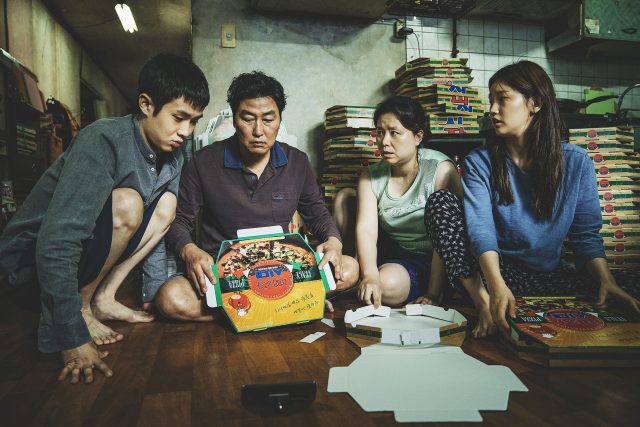Cannes 2019: Parasite, by Luiz Oliveira

It’s the middle of the Cannes Film Festival and it seems directors’ greatest fear today is not criticism but rather the modern malaise of spoiler culture. Bong Joon-Ho’s latest is preceded by a letter from the South Korean director himself, asking journalists not to reveal the film’s plot after a specific point in the story. It’s the same request made by the makers of today’s other major release, Quentin Tarantino’s Once Upon a Time in Hollywood. But whereas that film rang nostalgic for a time 50 years ago, Bong’s Parasite is a very modern take on a centuries-old issue: the relationship between a society’s upper and lower economic classes.
Teenager Ki-Woo (Choi Woo-Sik), along with his sister Ki-Jung (Park So-Dam), mother Chung-Sook (Jin Chang Hyae), and father Ki-Taek (Bong regular Song Kang-Ho) live in a basement apartment in a Seoul shanty-town, all of them unemployed. Between folding up cardboard pizza boxes (the only work they can get in a gig economy) and eating meals in their living room, they have no prospects until a friend of Ki-Woo’s arrives with two intriguing opportunities. The first is a gift, a heavy piece of rock in an ornate box, from his deceased relative and the second, an announcement. He, the friend, is movin’ on up to America and he recommended Ki-Woo as a tutor to the young daughter of a wealthy couple.
After a bit of mad-cap, creative engineering, Ki-Woo has a college diploma in his hand and is out the door for his interview, prompting one of the film’s proud outbursts from his father: “Do they have a forgery degree in Oxford?” Once he gets the job, Ki-Woo meets the very wealthy Park family: mother Yeon-Kyo (Cho Yeo-Jeong), a ditzy but effortful housewife, teenage Da-Hye (Ziso Jung), who needs the tutoring and is a lot more interested in studying her own lustful hormones than schoolbooks, Da-Song (Hyeon-Jun Jung), a hyperactive child, and Mr. Park (Lee Sun-Kyun), the corporate exec with a very calm and cool demeanor. That these two families are composed of the same number and gender distribution is no metaphorical accident.
Sensing an opportunity, Ki-Woo quietly remarks that the bratty, seemingly out-of-control Da-Song could use an art tutor. The mom is very proud of her child’s artistic oeuvre, which she compares to Basquiat’s and is happy to have recognized as potential. Naturally, the tutor Ki-Woo recommends is his own sister, not that anyone needs to know they’re related. Once she is installed in the house, the positions of Mr. Park’s driver and the household’s governess also seem pretty interesting…
Bong is very happy to indulge in farcical satire and by the midpoint of his movie, it seems that we’re settling in for a modern take on the contrasts between two players in the class struggle. From the underground dwelling of Ki-Woo’s family, their window always a target for drunken public urination, to the Park’s incredible designed chateau of glass and stone, to the petty grievances that grow on each family’s psyches, all is very reminiscent of Robert Altman’s Gosford Park in a thematic way. The similarities continue between both films, where a central disruption occurs and all is thrown into upheaval.
Whereas that British film is concerned with how the class differences are formal and locked down, maintaining all of its drama forcefully subsumed and discreet, fans of Bong’s previous work (including another open satire of social structure, Snowpiercer) know that his sensibilities are much more explosive. His greatest trick in Parasite, though, is that the idle rich aren’t purely contemptible people and that the audience’s sympathies can be aligned with both of these families’ tribulations, at least for a while.
American audiences will be incredulous at how similar Parasite‘s themes and narrative choices are to another recent domestic success, which can’t be named here. Two film-makers working decidedly apart have synched up their movies in ways that reveal how necessary it is for populations and governments to reckon with class inequality. This film goes a little farther out in time for its ending but a descent from comedy to gruesomeness is haunting the minds of filmmakers around the globe.




























